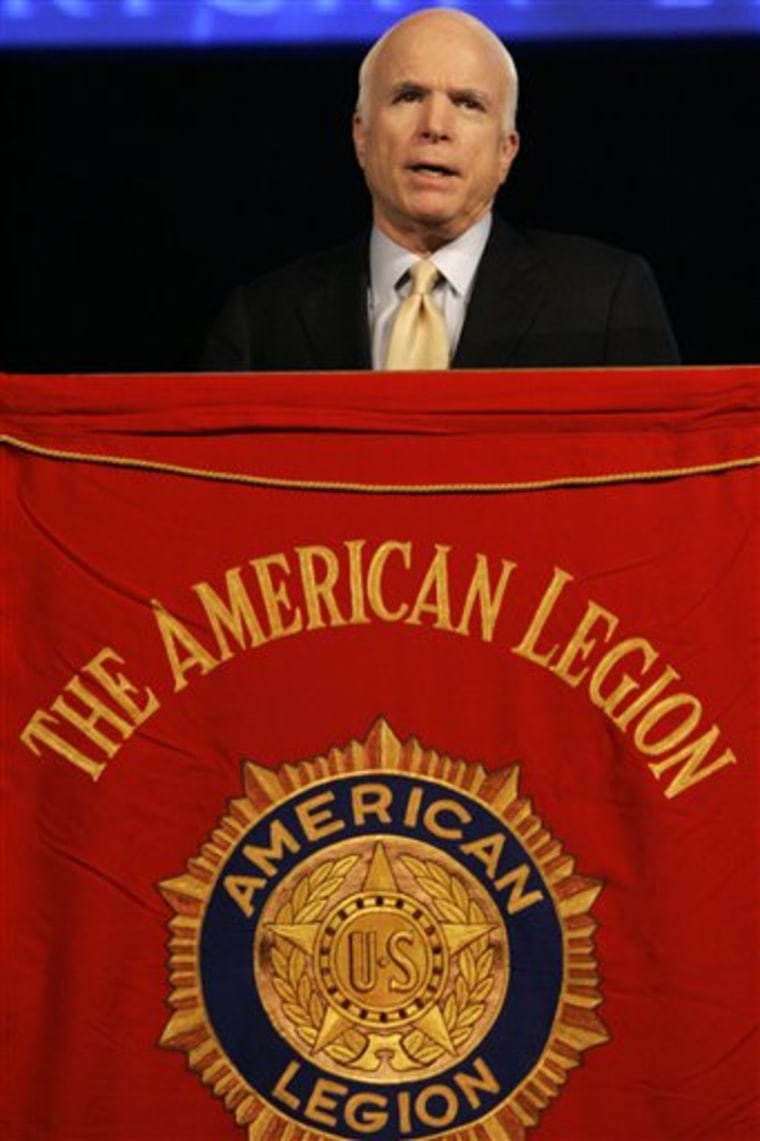Republican presidential candidate John McCain told veterans Tuesday that Democrat Barack Obama's opposition to the Iraq war and preference for collective diplomacy over U.S. leadership would create more trouble and aggression in the world.
"The next president must bring to office a clear-eyed view of our nation's role in the world as the defender of the oppressed and a force for peace," McCain told a convention of the American Legion, a friendly audience for McCain, a former Navy aviator and one-time prisoner of war in Vietnam. Obama is to speak to the group Wednesday.
McCain argued that Obama is too shy about leading America to exert itself in world affairs.
"In the end, confusion about such questions only invites more trouble, violence and aggression," said McCain.
McCain has sought to keep foreign affairs prominent in the campaign debate, because most polls show him with an edge over Obama when voters are asked who is most qualified to be commander in chief. Obama's campaign has increasingly focused on economic issues, which polls indicate is the top issue on voters' minds and an area in which he outdistances McCain.
The two candidates sharply diverge over the Iraq war: Obama opposed the war and wants to withdraw U.S. combat troops within 16 months of taking office; McCain long pressed for more U.S. troops to fight the war and argues that last year's U.S. troop surge demonstrates that victory is possible and American forces should stay until they achieve it without any abstract timetable for withdrawal.
McCain said he drew different conclusions than Obama expressed in his recent Berlin speech when he argued that the Cold War ended because major nations came together.
McCain argued that America led the way to the end of that conflict and he took the opportunity to draw attention to his firsthand experience in conflict.
"Now I missed a few years of the Cold War as a guest of one of our adversaries, but as I recall the world was deeply divided during the Cold War — between the side of freedom and the side of tyranny," said McCain. "The Cold War ended not because the world stood as one but because the great democracies came together, bound together by sustained and decisive American leadership."
McCain also criticized Obama for saying after the Russian invasion of Georgia: "We've got to send a clear message to Russia and unify our allies. They can't charge into other countries. Of course it helps if we are leading by example on that point."
The Arizona senator said he doubted Obama's remark was meant as a criticism of U.S. intervention to depose the Taliban in Afghanistan, which the Illinois Democrat supported, or in Kosovo to end Serbian slaughter of civilians. McCain concluded that Obama's remark must have been a reference to the U.S. invasion of Iraq.
"If he really thinks that, by liberating Iraq from a dangerous tyrant, America somehow set a bad example that invited Russia to invade a small, peaceful, and democratic nation, then he should state it outright," McCain said, "because that is a debate I welcome."
In fact, the Russians have been using the U.S. intervention in Kosovo, not the Iraq war, to justify their attack on Georgia.
On Monday President Bush said, "Georgia's territorial integrity and borders must command the same respect as every other nation's, including Russia's."
Russia says the West undermined its own arguments for the sanctity of Georgia's borders by supporting Kosovo's declaration of independence from traditional Russian ally Serbia.
